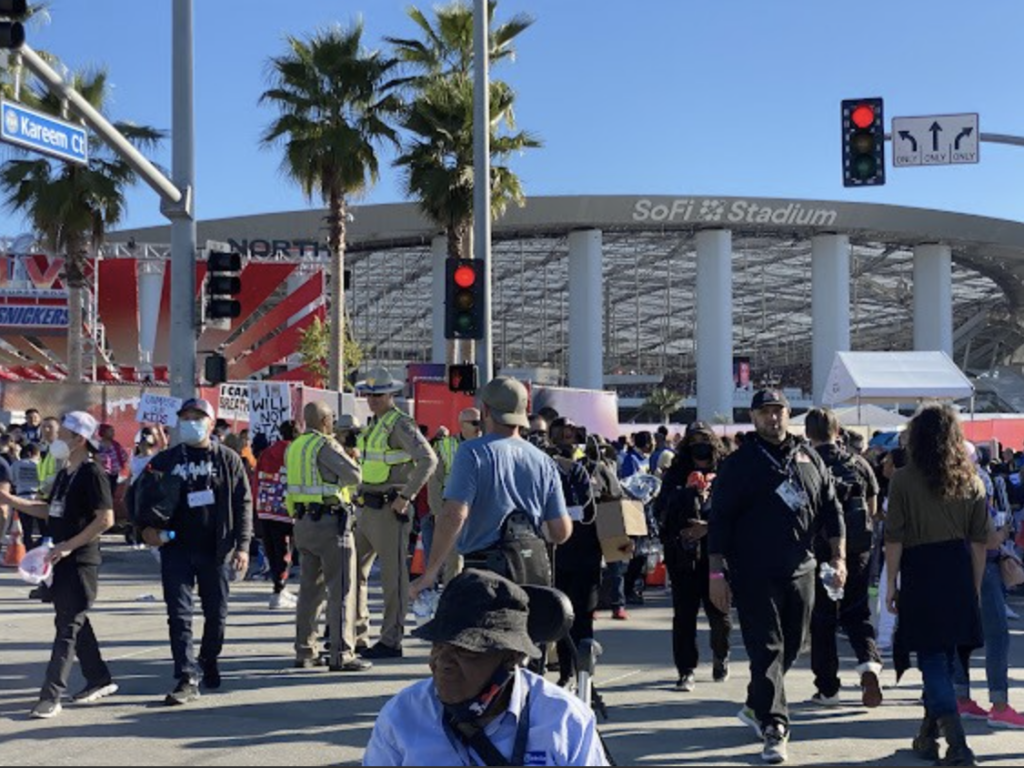 [1]
[1]PHOENIX (BP) – As thousands of fans gather in person to attend Super Bowl LVII in Phoenix this weekend and millions more watch on television, missionaries and volunteers with Send Relief’s Los Angeles Ministry Center will be on the streets of Phoenix, keeping a watchful eye out for human trafficking activity.
Human trafficking is far more expansive than many people assume. It can mean the transportation, transfer and abuse of victims, the harboring or enabling of traffickers and more. Trafficking includes deception, coercion, abuse of power and exploitation in return for money, sex, labor, goods or gifts.
If a victim is under the age of 18, survivors never have to prove force or fraud because no child can legally give consent – period.

Young children and runaway teens are vulnerable to trafficking – especially in large cities where disappearances are more frequent – so when Send Relief picked a site for its new Los Angeles Ministry Center [2] in 2020, a lot of thought and intention was put into its specific location.
Placed in a city with the rapidly growing epidemic of child trafficking, Send Relief’s Los Angeles Ministry Center works with partners to help survivors who have escaped or been rescued.
Send Relief has partnered with In Our Backyard [3] to fight against human trafficking during this weekend’s game, too. In Our Backyard is a non-profit that works with the FBI, local police and specialized human trafficking task forces in different cities for each Super Bowl.
Before each Super Bowl, they travel to the host city and rally the help of local churches and non-profits. In the weeks following, In Our Backyard hosts a large training to raise awareness about human trafficking and mobilize church members to help rescue children. They work with the FBI to obtain a list of children who are suspected of being trafficked, and in the days leading up to the game, church members and non-profits canvas the community surrounding the stadium, posting hotline numbers in convenience store bathrooms, hotels and other common stops for victims.
Tracy, a Send Relief missionary serving at the Los Angeles Ministry Center, described some common misperceptions people might have about those caught in trafficking.
“It’s a myth that victims are mostly foreign immigrants,” she said, “that trafficking always involves crossing borders, that physical bondage and restraint are always involved, that sex trafficking is the only form of this type of exploitation and that victims will readily identify themselves as victims.”
From Tracy’s personal experience with survivors, traffickers often follow big sporting or music events because more people will want to celebrate by buying drugs and sex, though that’s by no means the only time trafficking is an issue.
“I’ve personally met two teenagers who were brought into the city by their trafficker for the weekend during the baseball playoffs this year in L.A., and it was heartbreaking,” Tracy said. “I’ve also known others who were trafficked during sports car conventions. What’s often difficult in these situations is that victims may not want to testify or press charges because they may fall in love with their trafficker, have a trauma bond or experience Stockholm Syndrome.”
Ministry Center staff will be looking for children and teenagers who may be listed in the “missing” section of newspapers, teens with no belongings on them, children who won’t answer questions or who have an older person answering queries directed at them, as well as teens who have no forms of identification or payment with them.
“Last year during the Big Game outreach, one of the gas station attendants we spoke with about warning signs saw a teenager coming in and out all day, so they wrote down the suspected trafficker’s license plate number. Later that day, authorities arrested the trafficker and saved that child’s life,” Tracy said.
Because of awareness programs like this and vigilant patrolling, 14 of the 36 children who went missing during the Super Bowl last year were found alive. When the city of Los Angeles gave a press release about the success of rescuing so many children, they acknowledged they could not have accomplished this without the work of the Church and non-profits.
“So many people are caught in the mindset of ‘I would never do that’ or ‘How did these people get in this situation?’” said Kellee, a North American Mission Board missionary who serves with Send Relief Los Angeles. “But the reality is the trauma that survivors have been through is the same kind of trauma that I could’ve been through. When you realize that, it allows you to have so much more compassion.”
“You’re just dealing with people who have been through so much adversity,” Kellee said. “The survivors have had to make life and death decisions, and their choices can barely be called choices – they are trying to survive, and I need Jesus just as much as they do.”
This year, the Send Relief team in Los Angeles will be canvasing the community around the stadium in Phoenix to raise awareness about the children suspected of being trafficked during the Big Game at local convenience stores, hotels and other local spots.
People can support this Send Relief ministry in the following ways:
- Pray that God will rescue children out of human trafficking. The rescue is just the beginning, so pray as well for wise follow-up in the form of mentorship, discipleship and foster families as children rebuild their lives after trauma.
- Pray that peoples’ eyes will be opened, so they can recognize potential victims and take proper action.
- Invite others to join the fight with a financial donation to Send Relief [5], so that programs like this can continue saving lives.
To learn how to join the fight and support Send Relief’s anti-human trafficking efforts in North America and around the world, visit here [6].
This story was compiled by Send Relief ministry staff. Last names have been withheld to protect those serving in this sensitive ministry.
